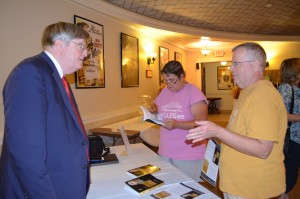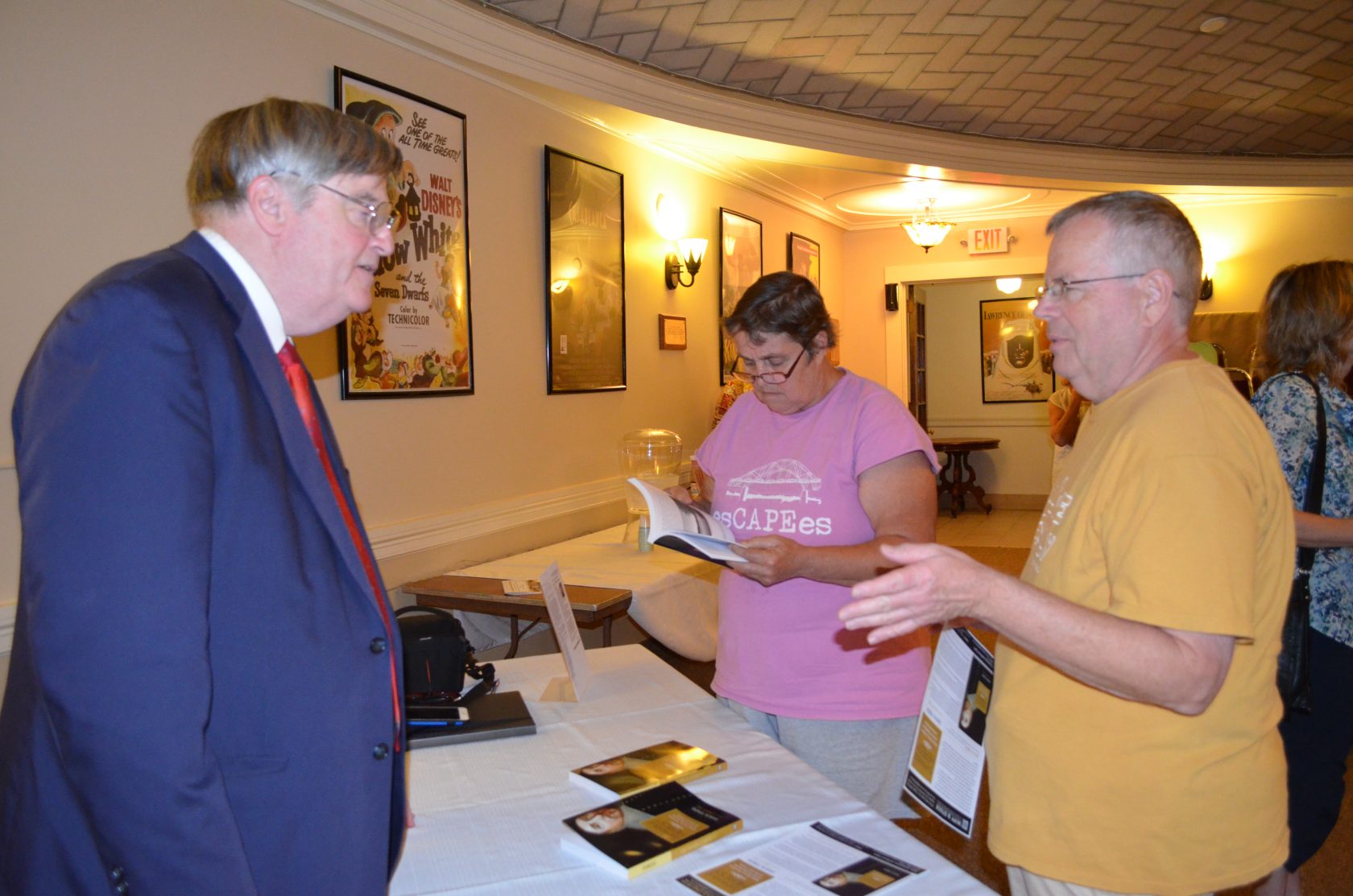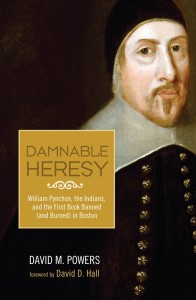WESTFIELD-Since 1956, historian and author David M. Powers has had a fascination with William Pynchon, founder of Springfield.
On Wednesday night, Powers shared insights about Pynchon – his origins in England, his roles in government, and his understanding of Native peoples – along with his “ill-fated theological undertakings,” during a talk that launched the Westfield Athenaeum’s fall and spring speaker series.

Gregory Smith of Montgomery directs a question to historian and author David M. Powers during a book signing at the Westfield Athenaeum. Powers’ lecture launched the fall and spring lecture series. Diane Snyder is seen in the background.
“This is a wonderful opportunity to also have an author talk to us about banned books during national Banned Books Week,” said Joyce Peregrin, public services librarian, noting Pynchon’s 1650 book titled “The Meritorious Price of our Redemption” was the first book banned and burned in Boston.
For one hour, Powers engaged the audience in the Lang Auditorium with a unique portrait of the man best known for founding the city of Springfield. Through dates, quotations, and photographs, Powers mapped out Pynchon’s achievements, his shrewd business dealings, interactions with government officials and the Native peoples – and also explained in detail his bold treatise on the Atonement. Powers is the author of “Damnable Heresy: William Pynchon, The Indians, and the First Book Banned and Burned in Boston.”
“Pynchon’s Christ is timeless and pristine,” said Powers.
Powers shared pages of Pynchon’s banned book that included excerpts including “Christ did not suffer for us those unutterable torments of God’s wrath.” Instead, Pynchon notes that Christ “redeemed us by a satisfactory price of atonement – obedience.”
Powers added that while people may consider Pynchon a hero of free thinking because the book was banned, he believes the banning of the book was a political decision.
“His book was condemned and symbolically burned by the Bay Colony legislature because of their concern for how the English Parliament might react to strange ideas from New England,” said Powers.
In addition to the book banning episode, Powers explained in detail how Pynchon became one of the wealthiest and most influential men in the Massachusetts Bay Colony.
“He initially settled in Roxbury, near Boston, but in 1635 led a settlement expedition into the Connecticut River Valley, and founded what would become Springfield,” said Powers. “Although the land was not the best for farming, the location was a good one for him to carry on his fur trading, as it was near beaver colonies and his trading partners, the Native peoples, and was on a major transportation route, the Connecticut River.”
Powers noted that by 1652, Pynchon had transferred his properties to his son John and returned to England where he spent the rest of his life. Pynchon also continued his writings until his death in 1662.
Powers ended his talk with a question-and-answer session, as well as a book signing.
For Dr. Mara Dodge, a professor of history at Westfield State University, the lecture was “dynamic.”
“I teach in Westfield so the references to our region were especially fascinating,” said Dodge.
Diane Snyder said she attended the lecture because of her passion for lifelong learning.
“I’m especially interested in Native American culture and much of what we know comes from records of Pynchon’s time,” said Snyder.
For Gregory Smith, the reason for his attending the lecture was personal.
“Through hearsay and family members, I’ve wondered about my family’s roots in the Connecticut River Valley area,” said Smith. “I was hoping there was a reference to those first families who settled in Springfield. I enjoyed the lecture but realize now I have to do more research on the lists of immigrants who settled along the Connecticut River.”
Due to library construction which gets underway shortly, the speaker series will continue at 6:30 p.m., however, all programs will now be conducted at St. John’s Lutheran Church on Broad Street.
The speaker series also includes:
Oct. 25, “From the Shadow of JFK: The Rise of Beatlemania in America,” presented by Aaron Krerowicz.
Nov. 16, “The Fires of Westfield: Local History” by Dr. Robert Brown.
Jan. 18, “Philip Payton: Local History” with Dr. Robert Brown.
Feb. 15, “Teddy Roosevelt: Mind, Body and Spirit,” with Ted Zalewski.
March 15, “A Celebration of Irish Songs and Stories” with Kate Chadbourne.
April 19, “Henry Beston’s Cape Cod: The Outermost House,” presented by the Henry Beston Society.
May 17, “Beekeeping” by Dan Conlon of Warm Colors Apiary in South Deerfield.
For more information on the speaker series which is free and open to the public, call (413) 568-7833, or visit www.westath.org.



